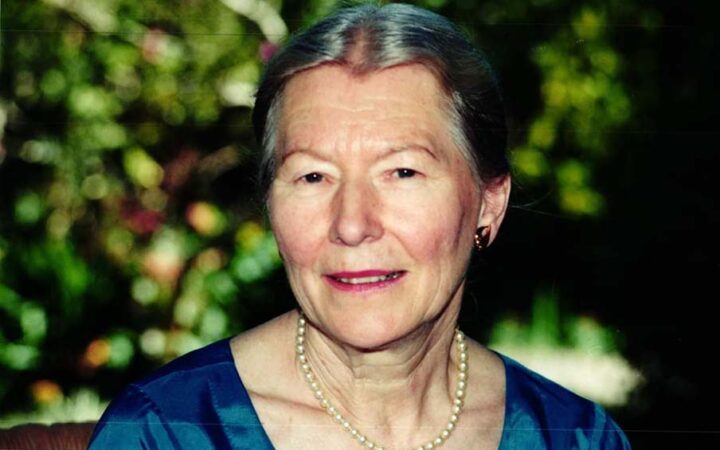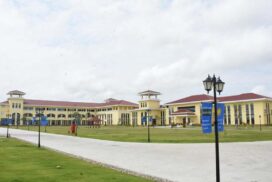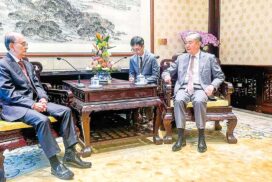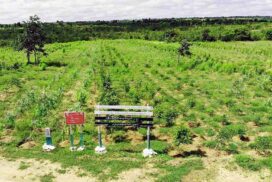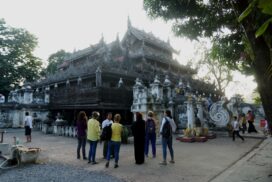Anna Allott (Daw Khin Khin Chaw)
Sayama Anna Allott (Daw Khin Khin Chaw) (1930-2024) passed away on 14 April 2024 in the United Kingdom at the age of 93. Notwithstanding her venerable age to those who value her contributions to Myanmar language and literature, her demise is indeed a great loss. She has studied, conducted research and written about Burmese language and literature for close to 70 years. Just before I learned of her passing through social media, by chance, I saw photocopies of articles written about Myanmar literati, including Thein Pe Myint and Pi Moe Hnin, by other Myanmar literati such as the late Maung Tha Noe and the late Ludu Sein Win (whose contributions Anna edited). The brief analysis and commentary of those writers were compiled by Sayama (Daw) Anna and published either as books or chapters about 20 years ago.
In a post that I read on social media, I noted that Anna did not like the ‘mixing’ of her name with Myanmar and English terms like ‘Aunty Khin Khin Chaw’ or ‘Aunty Chaw’. She prefers to be called ‘Ma Ma Chaw’ or ‘Daw (Daw) Khin Khin Chaw’. Henceforth, I will use either ‘Anna’ or ‘Daw Khin Khin Chaw’.
A local child or, indeed, adult foreigners learning Burmese had to study the language first and then (perhaps) literature. Starting in the mid-1950s, Anna learnt the Burmese language. Later, she focussed more on literature, translating and commenting on various Myanmar novellas, short stories and poems.
As this is a personalised tribute, I should state that Anna initially (anonymously?) refereed to two articles that I sent to Westerly. A literary journal published by the English Department of The University of Western Australia.
The first article I sent to Westerly was my tribute to the late Sayagyi Minthuwun, and it was published with the title ‘Minthuwun: A Tribute to a gentle Burmese Poet’ in the 2005 issue of Westerly Journal. I know it was sent to Anna since there is an addendum at the end of my article. Anna initially translated one of Minthuwun’s poems, which was apparently written anonymously, and Ana mentioned a few of my comments in my tribute.
The second article of mine published in Westerly in 2010 was titled ‘Shortened Cigars Stained with Nostalgic Tears’. The article is my translation and commentary of a poem by the now United States-based writer Maung Swan Yi after the death of his friend poet, Tin Moe. In his poem, Maung Swan Yi ‘harked back’ to the year 1959 when he, Tin Moe and another late poet, Kyi Aung, were ‘mates in poetry’, so to speak, while studying at the University of Mandalay. Maung Swan Yi recalled the occasion when Tin Moe impromptu composed the three-line short poem of one of his most well-known poems, Ei Thei Gyi ဧည့်သည်ကြီး (‘The Great Guest’). I know my article was sent to Anna to referee it since the Editor of Westerly mentioned to me that Anna complimented my article and recommended its publication.
I have a brief discussion by email of the mixed style of Myanmar writing used by quite a few Myanmar writers where the formal (အရေးစကားပြေAyae Zagar Pyae) and colloquial (အပြောစကားပြေ/စကားပြောသလိုရေးA Pwaw Zagar Pyae/Zagar Pwaw the Lo Yae) are mixed some time in the same paragraph indeed even in the same sentence. I would eschew the mixed use of colloquial and formal written styles. If one writes in a formal style like, say, the late U Aye Maung (Sarpay Beikman) or the late Paragu, then write them in that style in its entirety. If one prefers the colloquial or spoken style like, say, the late Ludu Daw Amar (in post-1966 of her writings) or the late Maung Tha Noe (in post-1965 of his writings), do write in that style, not ‘mixed’ ones. Anna wrote to me to the effect that writing styles do change, and she did not think that those who wrote in the mixed style(s) should be critiqued. Still, as far as Myanmar writing styles are concerned, I am a ‘purist’.
In the late 1990s, I enquired from her what the phrase Hnyi Khoan ညှိခုံ meant. She kindly replied to me in Myanmar language that it is like ညီအောင်ညှိNyi Aung Hnyi. From our correspondence, I gather that it means ‘arbitral tribunal’ in existence in the days of the Myanmar kings.
On 29 November 2003, on Kyee Kyee (‘great aunt’), the late Ludu Daw Amar’s 85th birthday, my article honouring the then-living literary lady doyen in Myanmar was published in the Jordan Times. Internet access was unavailable in the country at that time. Anna kindly brought a printout of my article to Mandalay during one of her visits and showed it to Daw Amar. Kyee Kyee mentioned to me with a smile that I have provided lots of information about her (မင်းရေးတာက စုံလို့ပဲMinn Yae Dar Ga Soan Loat Pae) in my article. I am grateful to Anna for bringing forth my article about Ludu Daw Amar to show to her.
Anna Allot had written at least three obituaries about three Burmese literary figures and published them in newspapers in Britain. The writer and translator Mya Thant Tint’s obituary written by Anna Allott was published in the Times of London, but as was the style and practice of the Times, Anna’s name was not mentioned. Anna also wrote an obituary for another female doyen writer, Daw Khin Myo Chit, and I think it may have been published in The Independent or The Guardian in Britain. I do recall that she contacted me by email, perhaps to enquire or verify a few details about Daw Khin Myo Chit and also to ask for her photo when I said that she could try to write or phone the late family Anna replied somewhat tartly (as she occasionally did) that ‘she did not want to bother the family’.
On the night before I learned of Anna’s passing, I was thinking of her comment that she tried to send her obituary tribute of Ludu Daw Amar to The Times of London (in April 2008), but at that time, Anna said many important figures in the UK and abroad were dying so there was no ‘space’ in the obituary pages of The Times. Hence, Anna’s tribute to Ludu Daw Amar was published in The Guardian (UK) sometime in April 2008, sixteen years to the month, almost to the day before Anna herself passed away. The writer is unaware of whether or not tributes of Mrs Anna J. Allot (alias) Daw Khin Khin Chaw appear in newspapers in the United Kingdom and elsewhere and, if so, who wrote them. This note is a personalised appreciation of her contributions to Myanmar language and literature.
Saya John Okell (U Hla Thein)
Saya John Okell (1934-3 August 2020) was a slightly younger contemporary of Anna Allott. Saya Okell’s achievements in the Burma/Myanmar studies, especially in the field of linguistics, are of great significance. Among many others, he was the creator of Avalaser Burmese computer font. Yours truly is so technically unsophisticated that he does not know how to effectively use any of the Myanmar fonts, whether Avalaser, ဇော်ဂျီZawgyi or ပြည်ထောင်စုPyidaung Su (Unicode). Saya Okell learned Burmese with the late Sayagyi Dr Hla Pe and his slightly older contemporary Anna Allott. The various books on Burmese linguistics, grammar, and colloquial usages that Saya Okell has produced since 1969 are significant contributions to this genre. Indeed, in 2002, Anna Allott and Saya John Okell jointly authored the Burmese/Myanmar Dictionary of Grammatical Forms.
It is stated that Anna Allott’s main (not exclusive) focus or speciality was in the literature field. It can be argued that Saya John Okell’s main (not exclusive) focus was in the field of linguistics and grammar. Still, Professor Okell also had an interest in Burmese literature and songs. As early as 1963, Sayagyi Dr Hla Pe (Professor of Burmese at the School of Oriental and African Studies), Anna Allott and John Okell published an article ‘Three “Immortal”. Burmese Songs’ in the Bulletin of the School of Oriental and African Studies.
When Saya Okell’s own Sayagyi, Dr Hla Pe, passed away, he wrote an obituary of Dr Hla Pe in the Bulletin of Burma Research Volume 5 No 1 & 2. I do not know whether or not Sayama Daw Khin Khin Chaw published an obituary of Saya John Okell, who passed away in August 2020 and who predeceased her by 3½ years. This humble (in one sense for Saya Okell, a much belated) and brief tribute to two leading Myanmar scholars from the United Kingdom can barely touch the contributions they have made.
Professor Ohno Turu
Another Myanmar scholar of Japanese origin is Professor Turu Ohno (alternative spelling and designation Ono, Turu) (1935-7 October 2022). Ohno Turu taught Burmese/Myanmar at the Osaka University of Foreign Studies from 1965 to 2001. Saya Ohno Turu has published books about the Myanmar language, literature and aspects of Burmese history in Japanese, English and Myanmar languages. In 1969, Saya Ohno Turu published an article in Burmese ဒေသန္တရသုံးမြန်မာစကားများDethandaya-thoun bama-zaga mya (‘The Burmese dialects’) in the book ကဗျာအကြောင်း စာအကြောင်းKabya-akaung Sar Akyaung (‘On Poetry and Prose’). This writer has also seen other articles written in the Myanmar language by Saya Ohno Turu.
I never had the chance to meet Saya John Okell. I am unsure whether I have personally met Saya Ohno Turu. Perhaps not. I met a Japanese scholar at the Burma Studies Conference held in Gothenburg, Sweden, in September 2002. He is probably Professor Ryuji Okudaira (U Thitsar), who is now about 84 years old. U Thitsar’s speciality is in pre-colonial Burmese history, and I have read a few of his articles written in English on that genre.
Incidentally, one of the highlights of the 2002 Gothenburg conference which I attended was that during the reception, a Russian scholar on Myanmar conversed initially in English with a Japanese scholar (probably Professor Okudaira), and then the Japanese scholar switched to Burmese, saying ကျွန်တော် မြန်မာလိုပဲ ပြောပါမယ် ခင်ဗျာKyundaw Myanmar Lo Pae Pwaw Bar Mei Khin Bya (‘I will now speak in Burmese’). Yours truly joined the conversation, and we all spoke the Myanmar Language. And this is the only time I have witnessed two foreign Myanmar scholars – a Russian and a Japanese- conversing in the Myanmar language!
(Daw) Yuri Takahashi, who teaches Burmese at The Australian National University, recently informed me that Saya U Thitsar is doing well. One wishes for his continued good health and to also make scholarly contributions.
The three scholars, Anna Allott, John Okell and Ohno Turu, passed away at an advanced age in their eighties and nineties. Verily, their contributions to the enhancement of the Myanmar language and literature are very significant.
